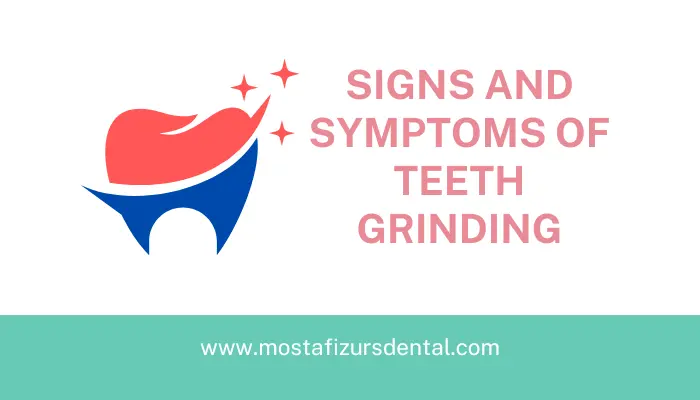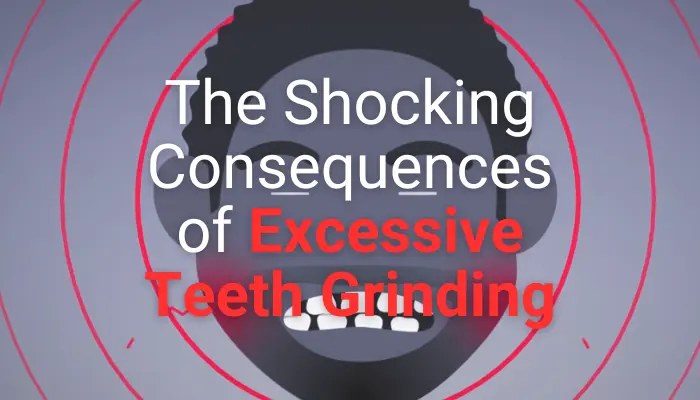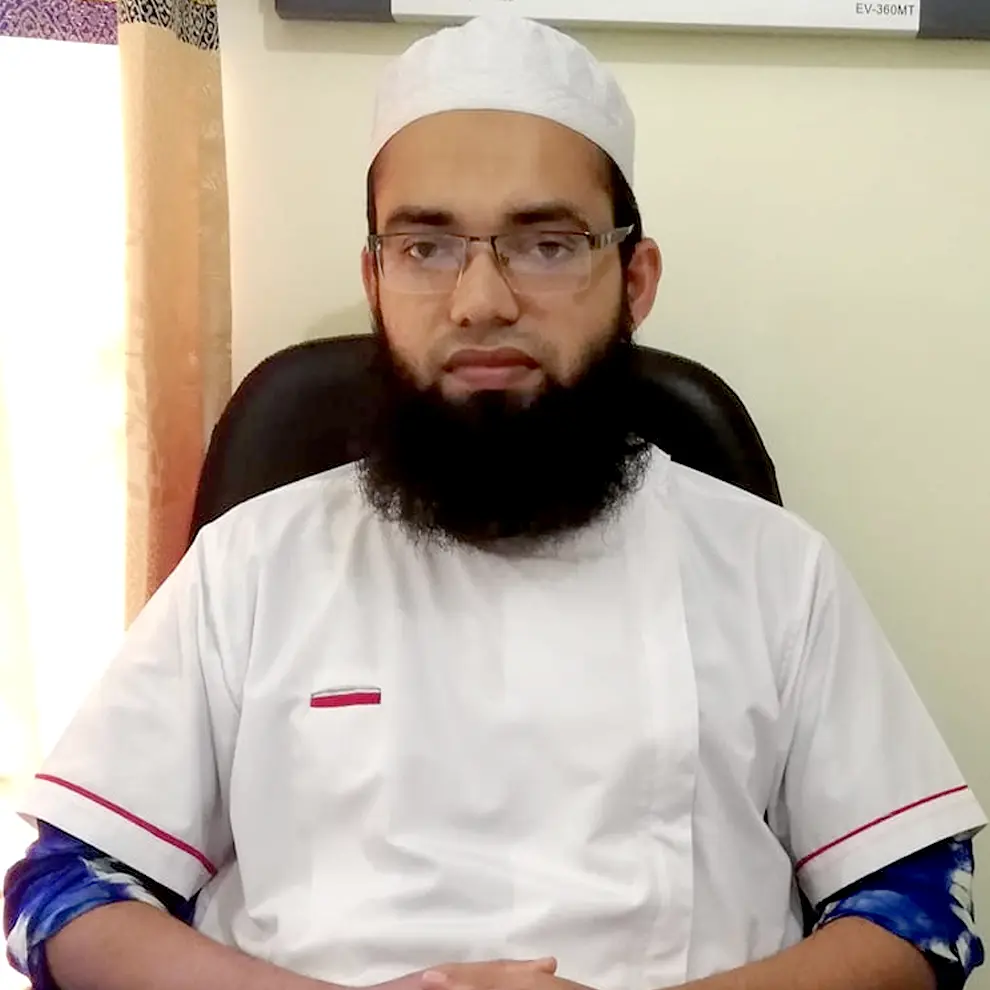Dr. Md. Mostafizur Rahman Khandaker, a leading dentist at Mostafizur’s Dental Comilla, is here to help you understand teeth grinding. This common condition disrupts sleep and damages teeth, but there’s hope! Learn about the causes, symptoms, and effective treatment options to regain a peaceful night’s rest and a healthy smile.
What Is Teeth Grinding (Bruxism)?
Teeth grinding, or bruxism, is a condition where you unconsciously clench, gnash, or grind your teeth. It can happen either while you’re awake or asleep. Occasional grinding is normal, especially during stressful periods, but frequent grinding can damage your teeth, jaws, and even lead to headaches.
You might not even be aware you grind your teeth, especially if it happens at night. Stress, anxiety, and other sleep disorders are often contributing factors to this condition, which affects people of all ages.

13 Signs and Symptoms of Teeth Grinding (Bruxism)
The nature of bruxism, particularly nocturnal bruxism, makes it challenging to self-diagnose. Often, a loved one is the first to notice the grinding sounds during sleep. However, several physical symptoms can serve as red flags:

1. Tooth Damage
Flattened, fractured, chipped, or loose teeth are telltale signs of bruxism. The grinding motion wears down the enamel, exposing deeper layers and increasing sensitivity.
2. Audible Grinding or Clenching:
One of the telltale signs of bruxism is the audible grinding or clenching of teeth, which may be loud enough to awaken a sleep partner. This rhythmic grinding sound often occurs during sleep and can indicate significant pressure being exerted on the teeth and jaw.
3. Jaw Pain and Discomfort
Tightness, soreness, or a dull ache in the jaw muscles upon waking up is a common symptom. Bruxism can also lead to temporomandibular joint disorder (TMJ), causing pain in the jaw joint, headaches, and difficulty chewing.
4. Facial Pain
Aching or pain in the face, temples, and neck region can be a consequence of bruxism. The constant clenching can put strain on the facial muscles, leading to discomfort.

5. Earaches
Surprisingly, bruxism can mimic earache pain. The discomfort originates from the jaw joint and surrounding muscles, radiating to the ear area.
6. Headaches
Dull headaches, particularly in the temples, are frequently reported by bruxism sufferers. The tension in the jaw muscles can contribute to head pain, especially upon waking up.
7. Disrupted Sleep
Bruxism often disrupts sleep patterns, both for the individual experiencing the condition and their sleep partner. The rhythmic grinding noises can interfere with restful sleep, leading to daytime fatigue, irritability, and cognitive impairment.
8. Cheek Trauma
Unconsciously chewing on the inner cheek lining is a potential symptom of bruxism. This can cause irritation, inflammation, and even small wounds.
9. Increased Tooth Sensitivity
10. Worn enamel exposes the underlying dentin, a more sensitive layer of the tooth. This can lead to increased sensitivity to hot, cold, or sweet foods and beverages.
11. Limited Jaw Mobility
Bruxism can exert considerable strain on the temporomandibular joint (TMJ) and surrounding jaw muscles, resulting in symptoms such as tired or tight jaw muscles, jaw locking, or difficulty fully opening or closing the mouth. Chronic jaw pain or soreness, sometimes mistaken for an earache, can significantly impact daily functioning and quality of life.
12. Oral Tissue Damage
In addition to dental complications, bruxism can cause damage to oral soft tissues, such as the cheeks and tongue. Biting the inside of the cheek or tongue due to grinding can result in tissue trauma, leading to soreness, inflammation, and potential ulceration.
13. Associated Symptoms
Teeth grinding may also coincide with other symptoms, such as aching shoulders and neck, cracked or chipped tooth enamel, tooth indentations on the tongue, loose teeth, and tinnitus (ringing in the ears). These secondary symptoms highlight the systemic effects of bruxism on oral and musculoskeletal health.
Potential Causes of Teeth Grinding (Bruxism)
Teeth grinding, or bruxism, involves involuntary clenching or grinding of teeth. Its exact cause is complex, likely involving physical, psychological, and genetic factors. This section explores triggers for both awake and sleep bruxism.

Stress and Anxiety: The Top Contenders
Stress and anxiety emerge as the most common culprits behind teeth grinding. When faced with emotional strain, the body enters a heightened state of alertness.
This can manifest physically as teeth clenching or grinding, a subconscious attempt to release pent-up tension. Daily pressures, work deadlines, financial worries, and relationship issues can all be potential triggers.
Sleep Disruption and Related Disorders
Sleep plays a crucial role in overall health, and disruptions in sleep patterns can contribute to bruxism. Sleep apnea, a condition characterized by pauses in breathing during sleep, can lead to arousals from sleep and increase the risk of teeth grinding. This fragmented sleep pattern disrupts normal muscle relaxation, potentially leading to involuntary clenching during sleep.
Medical Conditions and Medications
Certain medical conditions can also be linked to bruxism. Parkinson’s disease, a neurodegenerative disorder affecting movement, can cause involuntary muscle movements, including teeth grinding.
Gastroesophageal reflux disease (GERD), characterized by stomach acid refluxing into the esophagus, can indirectly contribute to bruxism, particularly at night.
Additionally, some medications, such as antidepressants known as selective serotonin reuptake inhibitors (SSRIs), can list teeth grinding as a potential side effect.
Lifestyle Habits and Stimulants

Certain lifestyle habits and substances may exacerbate bruxism. Excessive caffeine intake, exceeding six cups of coffee daily, can heighten anxiety and stimulate the nervous system, potentially leading to teeth grinding.
Alcohol consumption, while often seen as a relaxant, can disrupt sleep patterns and increase muscle tension, creating a scenario conducive to bruxism.
Smoking can also contribute, potentially due to its stimulating effects and the development of abnormal jaw movements. Recreational drugs like ecstasy and cocaine can similarly disrupt the nervous system and muscle control, increasing the risk of teeth grinding.
Family History and Genetics
Research suggests a potential genetic link to bruxism. If you have a close family member who grinds their teeth, you may be more predisposed to developing the condition. While the exact genes involved are not fully understood, a genetic component seems to play a role in some cases.
Underlying Health Conditions:
Certain medical conditions, such as Parkinson’s disease, dementia, gastroesophageal reflux disorder (GERD), epilepsy, night terrors, sleep-related disorders like sleep apnea, and attention deficit hyperactivity disorder (ADHD), have been associated with an increased prevalence of bruxism.
These underlying health issues may disrupt normal sleep patterns or contribute to muscle dysfunction, leading to teeth grinding as a secondary manifestation.
Beyond the Basics: Other Potential Triggers
While less prevalent, other factors may contribute to bruxism. Misaligned bite (malocclusion), where the upper and lower teeth don’t meet correctly, can put strain on the jaw muscles and lead to grinding.
Children may grind their teeth due to teething discomfort or misaligned baby teeth, which usually resolves as their permanent teeth erupt. Certain psychological conditions like night terrors and ADHD may also be associated with bruxism in some cases.
Risk Factors of Teeth Grinding (Bruxism)
Teeth grinding, also known as bruxism, is a condition where you clench or grind your teeth involuntarily. While the exact cause remains unknown, several factors can increase your risk of developing bruxism. Here are some of the most common:
- Stress and Anxiety: Feeling overwhelmed, stressed, or anxious can trigger teeth grinding. People with depression or anxiety disorders are more prone to bruxism.
- Lifestyle Habits: Certain habits like smoking, excessive alcohol consumption, and high caffeine intake (more than six cups of coffee daily) can significantly increase your risk.
- Medications: Some medications, particularly antidepressants called selective serotonin reuptake inhibitors (SSRIs), may have bruxism as a side effect.
- Sleep Disorders: A strong link exists between sleep disorders like sleep apnea and bruxism. Research is ongoing to determine if sleep apnea causes bruxism or vice versa.
- Family History: Bruxism can run in families. If you have a family member with bruxism, you’re more likely to develop it as well.
- Personality Type: People with aggressive, competitive, or hyperactive personalities may be at a higher risk for bruxism.
- Medical Conditions: Certain medical conditions like Parkinson’s disease, dementia, GERD (gastroesophageal reflux disease), epilepsy, night terrors, and ADHD (attention-deficit/hyperactivity disorder) can be associated with bruxism.
Complications of Teeth Grinding
Although teeth grinding doesn’t usually cause serious problems, severe cases can lead to various complications. Here’s what you can expect if left untreated:
- Dental Damage: Bruxism can cause significant damage to your teeth, including wear and tear, erosion, cracked or loose teeth, and damage to fillings, crowns, or implants.
- TMJ Disorders: The temporomandibular joints (TMJs) are located on either side of your jaw. Bruxism can put strain on these joints, leading to pain, clicking sounds when opening your mouth, and difficulty chewing.
- Facial and Jaw Pain: Chronic teeth grinding can cause persistent pain in your jaw muscles and facial area.
- Headaches: Tension headaches are a common complication of teeth grinding.
- Sleep Disruptions: The noise from grinding your teeth can disrupt your sleep and that of your partner.
If you suspect you might be grinding your teeth, consult your dentist for a proper diagnosis and treatment plan. Early intervention can help prevent these complications and protect your oral health.
How Common is Teeth Grinding in Children?

The prevalence of teeth grinding in children is significant, affecting an estimated 15% to 33% of youngsters. It often peaks during two key developmental stages:
- Emergence of Baby Teeth: As your child’s primary (baby) teeth erupt, discomfort and teething pain can lead to grinding.
- Permanent Teeth Arrival: The transition from baby teeth to permanent teeth can also trigger bruxism due to changes in the jaw and bite.
- Fortunately, for most children, teeth grinding is a temporary phase that fades away as their teeth mature.
What Causes Teeth Grinding in Children?
The exact reasons behind childhood bruxism remain unclear, but several potential factors can contribute:
- Teething Discomfort: The emergence of new teeth can be uncomfortable, prompting your child to grind as a way to soothe the irritation.
- Misaligned Teeth: Improper bite or misaligned teeth can lead to uneven contact, causing your child to clench or grind to achieve a more comfortable jaw position.
- Stress and Anxiety: Just like adults, children experience stress and anxiety. Bruxism can be a subconscious response to these emotions.
- Medical Conditions: Certain medical conditions like allergies, ADHD (attention deficit hyperactivity disorder), and even earaches can be linked to teeth grinding.
- Medications: Some medications, such as antidepressants or antipsychotics, can have teeth grinding as a side effect.
Signs and Symptoms of Teeth Grinding in Children
While you might hear the telltale grinding noise at night, there are other signs to watch for:
- Tooth Wear: Excessive wear and tear on the chewing surfaces of your child’s teeth, especially flattening or chipping, can indicate bruxism.
- Jaw Pain or Headaches: Your child might complain of jaw discomfort or headaches upon waking.
- Increased Sensitivity: Teeth grinding can expose the dentin layer beneath the enamel, leading to tooth sensitivity to hot or cold.
- Tight Jaw Muscles: You might notice your child clenching their jaw during the day.
What to Do if Your Child Grinds Their Teeth
If you suspect your child grinds their teeth, here are some steps to take:
- Schedule a Dental Appointment: A dental examination can help identify the cause of the bruxism and assess the extent of any tooth wear.
- Address Underlying Issues: If an underlying medical condition is suspected, consult your child’s doctor for treatment.
- Stress Management Techniques: Techniques like relaxation exercises or bedtime routines can help reduce stress and promote better sleep.
- Nightguards: In some cases, your dentist might recommend a custom-made nightguard to protect your child’s teeth from wear and tear.
When to Worry About Teeth Grinding
In most cases, childhood bruxism resolves on its own. However, if the grinding is severe or accompanied by significant tooth damage, jaw pain, or sleep disturbances, consult your dentist or doctor to explore further treatment options.
Diagnosis of Teeth Grinding or Bruxism
Diagnosing bruxism often involves a collaborative effort between your dentist and, in some cases, your doctor. Here’s a breakdown of the typical diagnostic process:
1. Dental Examination
Your dentist will conduct a thorough dental exam to assess for signs of bruxism. This may include:
- Visual Inspection: Looking for chipped, cracked, or flattened teeth, worn tooth enamel, and excessive tooth wear.
- Jaw Muscle Evaluation: Checking for tenderness or tightness in the jaw muscles.
- Dental History: Discussing your symptoms, sleep habits, stress levels, and any medications you’re taking.
2. Partner Observation
If you suspect sleep bruxism, your partner’s observations can be valuable. They might notice grinding or clenching noises during your sleep.
3. X-rays or Other Imaging
In some situations, your dentist may recommend X-rays or other imaging tests to examine the extent of tooth wear, jaw joint integrity, and rule out other dental issues.
4. Sleep Study (Polysomnography)
If sleep bruxism is suspected and other diagnostic methods are inconclusive, a sleep study may be necessary. This overnight test conducted in a sleep center monitors brain waves, breathing patterns, muscle activity, and oxygen levels to confirm sleep bruxism and potentially identify sleep disorders like sleep apnea that can contribute to bruxism.
Treatment Options for Bruxism
Treatment for bruxism depends on the severity of your condition and the underlying cause. Your dentist or doctor will work with you to create a personalized treatment plan. Here’s an overview of the most common treatment approaches:
1. Mouth Guards
Custom-made mouth guards, also known as bite splints, are the most common treatment for bruxism. These acrylic appliances worn at night fit over your upper or lower teeth, creating a physical barrier to prevent teeth from grinding against each other. Mouth guards can help reduce tooth wear, jaw pain, and headaches associated with bruxism.
2. Stress Management Techniques
Stress and anxiety are significant contributors to bruxism. Techniques like meditation, deep breathing exercises, yoga, or cognitive behavioral therapy (CBT) can help manage stress and potentially reduce bruxism episodes.
3. Lifestyle Modifications
Lifestyle changes can significantly impact bruxism. Limiting caffeine and alcohol intake, especially before bedtime, can help promote relaxation and reduce teeth grinding. Maintaining good sleep hygiene practices, such as establishing a regular sleep schedule and creating a relaxing bedtime routine, can also be beneficial.
4. Dental Treatments
In severe cases of tooth wear caused by bruxism, your dentist may recommend restorative dental procedures like crowns, fillings, or onlays to repair damaged teeth and restore functionality.
5. Muscle Relaxants
Short-term use of muscle relaxants before bedtime may be prescribed by your doctor to relieve jaw muscle tension and discomfort associated with bruxism. This approach is usually temporary and often combined with other therapies.
6. Botox Injections
In severe cases where other treatments haven’t provided relief, botox injections may be considered. These injections target specific jaw muscles, temporarily relaxing them and reducing grinding activity. Repeat injections are typically needed every few months.
7. Addressing Underlying Conditions
If bruxism is associated with an underlying medical condition like sleep apnea or gastroesophageal reflux disease (GERD), treating the underlying condition may also improve bruxism symptoms.
8. Behavioral Therapy
For awake bruxism linked to habits or unconscious clenching, behavioral therapy techniques can help raise awareness of the behavior and promote relaxation techniques to reduce grinding.
9. Physical Therapy
In some cases, physical therapy exercises can help strengthen and improve flexibility in the jaw muscles, reducing tension and potentially alleviating bruxism symptoms.
10. Orthodontic Treatment
In rare instances, if your teeth’s alignment contributes to bruxism, orthodontic treatment like braces or aligners can be considered to improve your bite and potentially reduce grinding.
Note
Early diagnosis and intervention are crucial for managing bruxism effectively. By working with your dentist or doctor, you can explore the best treatment options to protect your oral health, alleviate discomfort, and enjoy a better night’s sleep.
FAQ: Teeth Grinding (Bruxism) Explained by Dr. Khandaker
What is the cause of grinding teeth?
The exact cause of teeth grinding (bruxism) is a mystery, but stress, sleep disorders, misaligned bites, medications, and even habits can contribute. When feeling overwhelmed, the body tenses up, and grinding can be a way to release that tension. Sleep apnea disrupts sleep patterns and muscle activity, leading to potential grinding. Medications and habits like excessive caffeine or unconscious jaw clenching can also play a role.
How do I stop grinding my teeth?
There isn’t a one-size-fits-all solution for stopping teeth grinding. Treatment depends on the severity and cause. Commonly used approaches include custom-made nightguards to protect teeth during sleep, stress management techniques to reduce grinding episodes, and lifestyle modifications like limiting stimulants and establishing good sleep routines. In some cases, treating underlying medical conditions or dental procedures like fillings or crowns might be necessary.
Can teeth grinding be cured?
While there’s no permanent cure for bruxism, effective treatments can significantly manage symptoms and prevent further damage. By addressing the cause and implementing a treatment plan, you can reduce grinding and protect your oral health.
How to fix grinded teeth?
Repairing grinded teeth depends on the severity. Mild cases might only require polishing, while more significant damage might necessitate fillings, crowns, or onlays to restore functionality and aesthetics. Your dentist will assess the damage and recommend the most suitable repair options.
Is teeth grinding genetic?
Research suggests a potential genetic link to bruxism. If you have a close family member who grinds their teeth, you might be more predisposed. However, genetics isn’t the sole determinant, and other factors like stress and lifestyle habits also play a role.
Takeaway
Don’t let teeth grinding grind you down! Dr. Khandaker offers a comprehensive guide to understanding and treating bruxism, empowering you to achieve optimal oral health and sleep quality.


